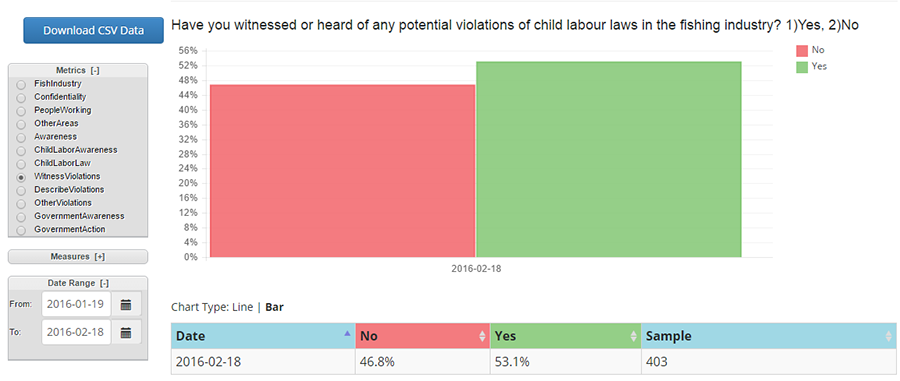- Contents
The US Department of Labor has found that 136 goods from 74 countries could be made by forced or child labor. Workers involved in the production of goods including fish, coffee, and cocoa are often the subject of poor working conditions and human rights violations, but because of the complexity of global supply chains in many cases these violations go unreported. Large corporations that ultimately sell those goods are so far removed from those involved in farming raw materials or packaging goods that it is difficult to track what is going on at the worker or community level: while there are some risk-management databases that gather this information, much information is sourced from legal filings or news reports, and violations could be going on for months or years before they are uncovered.
The mobile phone presents a simpler opportunity to reach workers at various points throughout a supply chain. Mobile penetration is on the rise in developing countries: according to GSMA, the association of mobile providers, unique mobile penetration in developing countries is currently at 59%, and expected to rise to 70% by 2020. Leveraging this technology, GeoPoll has developed a supply chain monitoring product that uses SMS surveys to reach farmers, factory workers, fishing communities, and others who have witnessed or even experienced labor violations. We use SMS to survey workers where they are — while maintaining privacy and security to report issues. The same tool that can alert a supply chain manager of malfeasance by a supplier can be used to disseminate information back to a victim that they can use to access resources and assistance.

GeoPoll uses the mobile phone to survey people throughout Africa and Asia on a wide range of topics: we gather data on food security that helps the World Food Program deliver food aid, report on daily media ratings throughout Africa, and worked with USAID to determine the impact of Ebola on West African economies. Using this technology we surveyed 300 people in coastal regions in Kenya in March 2015 and found that 69% of respondents had witnessed or heard of child labor law violations in the fishing industry, with underage workers being the main violation, followed by poor or dangerous working conditions.
In 2016, as part of the Partnership for Freedom ReThink Supply Chains competition, we expanded the project and surveyed 400 people in five regions of Ghana about labor in the fishing industry. 37.2% of respondents said were aware of people who are forced to work and not permitted to leave, and 53% had heard of or witnessed violations of child labor law. While 81% said they think the local government is aware of such child labor violations, only 70% thought the government would take action to prevent child labor. GeoPoll has visualized this data online so those who work on labor issues or with supply chains can easily access it, and has provided the data to local NGOs.
While this initial data only provides a snapshot look into one industry in two countries, it demonstrates the prevalence of human rights violations in global supply chains and the importance of data in quickly remedying such situations.
With the mobile phone, we have a new tool which can help multinationals, NGOs, and governments directly reach workers throughout a supply chain to gather regular, reliable data on working conditions, human trafficking, child and forced labor issues. Importantly, we have seen a willingness from workers themselves to tell us about their experiences — powerful data that we are obliged to act upon.
Samir Goswami is a Business and Human Rights Consultant and Max Richman is Chief Data Scientist at GeoPoll.
